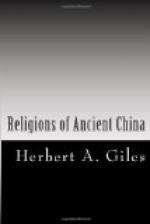Anthropomorphism and Fetishism.—One of the last Emperors of the Shang dynasty, Wu I, who reigned B.C. 1198-1194, even went so far as “to make an image in human form, which he called God. With this image he used to play at dice, causing some one to throw for the image; and if ‘God’ lost, he would overwhelm the image with insult. He also made a bag of leather, which he filled with blood and hung up. Then he would shoot at it, saying that he was shooting God. By and by, when he was out hunting, he was struck down by a violent thunderclap, and killed.”
God indignant.—Finally, when the Shang dynasty sank into the lowest depths of moral abasement, King Wu, who charged himself with its overthrow, and who subsequently became the first sovereign of the Chou dynasty, offered sacrifices to Almighty God, and also to Mother Earth. “The King of Shang,” he said in his address to the high officers who collected around him, “does not reverence God above, and inflicts calamities on the people below. Almighty God is moved with indignation.” On the day of the final battle he declared that he was acting in the matter of punishment merely as the instrument of God; and after his great victory and the establishment of his own line, it was to God that he rendered thanks.
No Devil, No Hell.—In this primitive monotheism, of which only scanty, but no doubt genuine, records remain, no place was found for any being such as the Buddhist Mara or the Devil of the Old and New Testaments. God inflicted His own punishments by visiting calamities on mankind, just as He bestowed His own rewards by sending bounteous harvests in due season. Evil spirits were a later invention, and their operations were even then confined chiefly to tearing people’s hearts out, and so forth, for their own particular pleasure; we certainly meet no cases of evil spirits wishing to undermine man’s allegiance to God, or desiring to make people wicked in order to secure their everlasting punishment. The vision of Purgatory, with all its horrid tortures, was introduced into China by Buddhism, and was subsequently annexed by the Taoists, some time between the third and sixth centuries A.D.
Chinese Terms for God.—Before passing to the firmer ground, historically speaking, of the Chou dynasty, it may be as well to state here that there are two terms in ancient Chinese literature which seem to be used indiscriminately for God. One is T’ien, which has come to include the material heavens, the sky; and the other is Shang Ti, which has come to include the spirits of deceased Emperors. These two terms appear simultaneously, so to speak, in the earliest documents which have come down to us, dating back to something like the twentieth century before Christ. Priority, however, belongs beyond all doubt to T’ien, which it would have been more natural to find meaning, first the visible heavens, and secondly the Deity, whose existence beyond the sky would be inferred from such phenomena as lightning,




